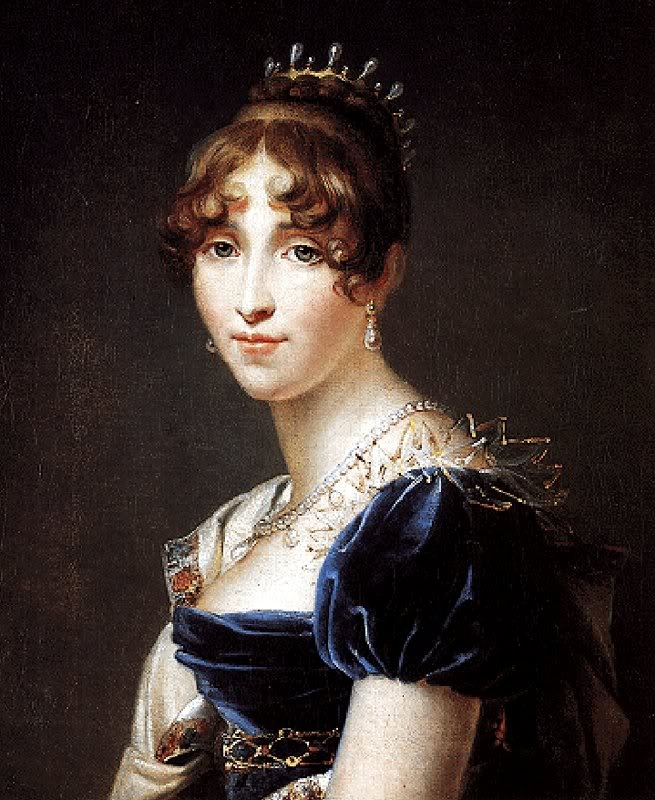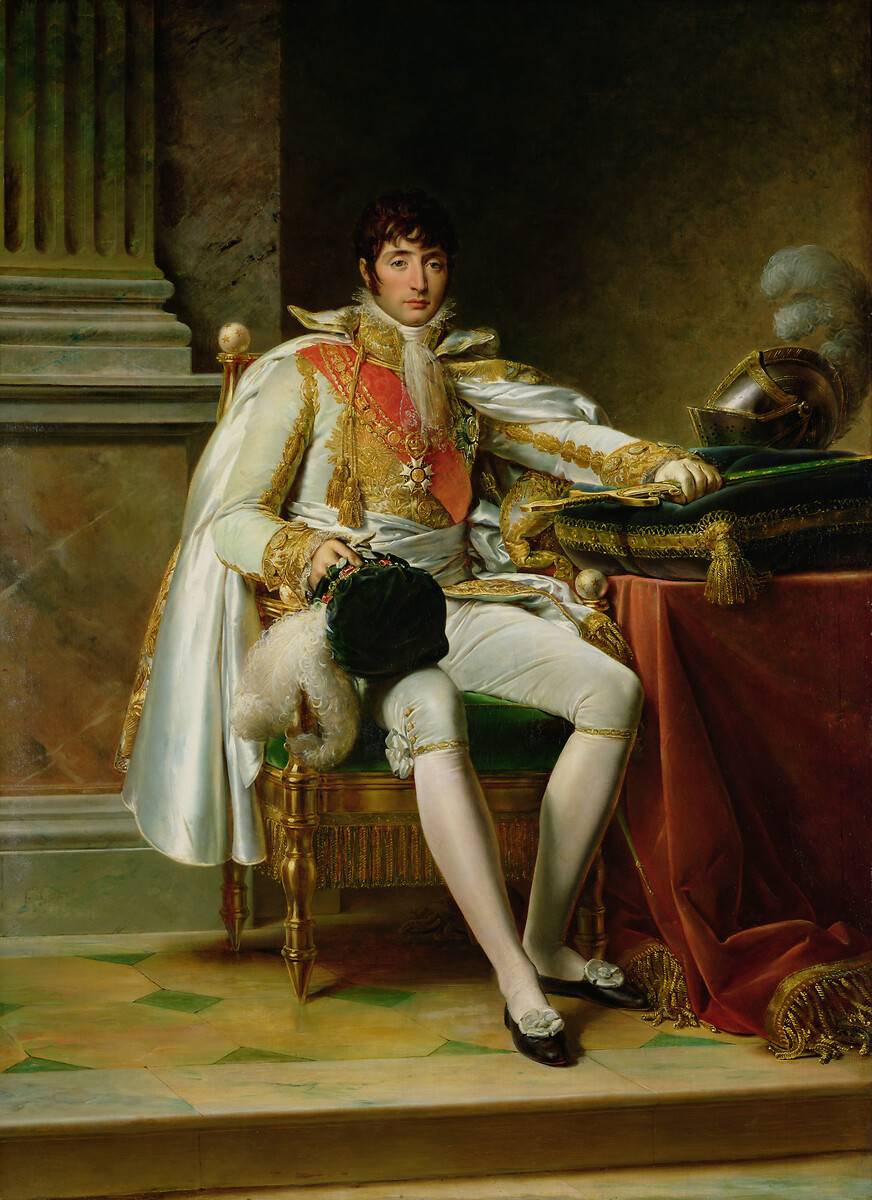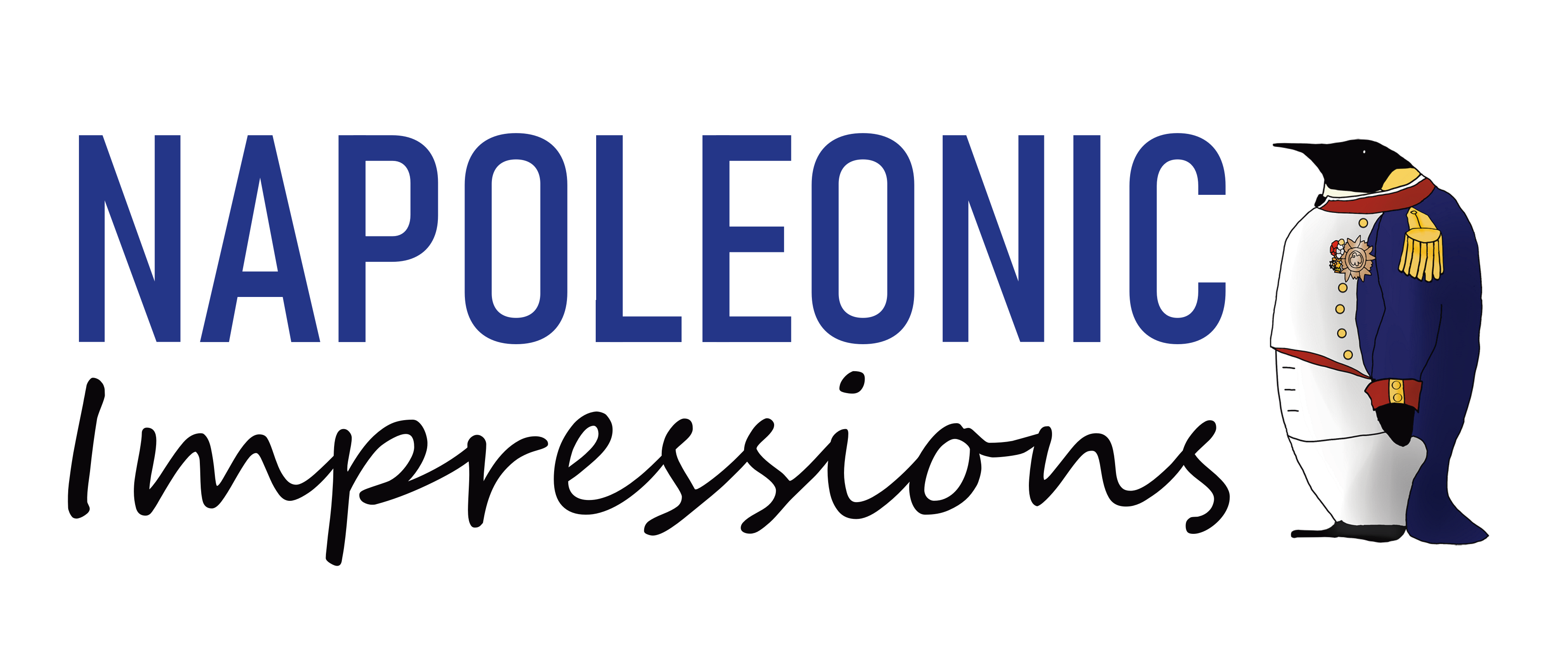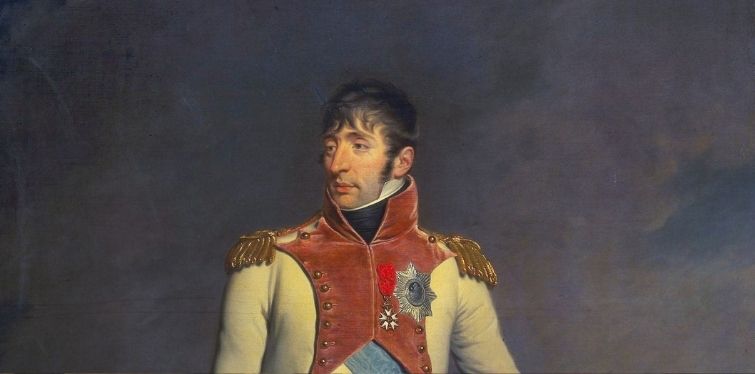Our series on Napoleon’s brothers continues this week with Louis Bonaparte. From a young age Napoleon was incredibly fond of Louis and had great expectations of him. He married him to his beloved stepdaughter Hortense, and made him King of Holland. But Louis would eventually suffer the ignominy of his kingdom being occupied by his brother’s armies and finding himself in self-imposed exile. In spite of this, it was left to Louis’s son to restore the French Empire.
Louis Bonaparte (Luigi Buonaparte) was born in Ajaccio on 2 September 1778, the fifth child and fourth son of Carlo and Letizia Buonaparte. When Carlo died in 1786, his eldest sons Joseph and Napoleon returned to Corsica to settle family affairs. During this visit Napoleon, already an artillery officer, took a liking to young Louis and planned to take him to France and become his tutor, training him for a career in the artillery. Political upheavals in France prevented Napoleon from realising his project to take care of Louis’s upbringing until January 1791, when Louis joined Napoleon's regiment at Auxonne. Napoleon doted on his younger brother and provided Joseph with enthusiastic updates about the progress of Louis’s education.
This arrangement did not last long, as Napoleon’s political ambitions encouraged him to return to Corsica with Louis in 1792. In April 1793, Louis was with his mother and his younger siblings in Ajaccio when they had to flee from a rebellion against French authority. In 1793 for his contribution to the defeat of the British at the Siege of Toulon, Napoleon was promoted to Brigadier General. In January 1794 he was appointed artillery commander of the Army of Italy and attached Louis to his staff as a sub-lieutenant. When Napoleon was recalled in 1795, he took Louis with him and sent him to the Artillery School in Châlons. Once again Louis’s studies were interrupted when his brother was appointed to command the Army of the Interior, and obtained for him a commission as a lieutenant of the 4th Artillery Regiment.
Louis remained part of Napoleon’s staff when he took command of the Army of Italy in 1796. Louis shared in the glory of his brother, who took care to make sure that he did not spare him from all the responsibilities of a staff officer. In the heat of battle Louis demonstrated that he was a brave and able soldier, living up to Napoleon’s high expectations. In July 1796, with the Austrians sending reinforcements in an effort to relieve the Siege of Mantua, Napoleon dispatched Louis to Paris to present his plans. In a letter to Minister of War Lazare Carnot, Napoleon wrote: “This brave young man deserves all the consideration that you may be so good as to show him.”
Carnot was impressed by Louis’s conduct and promoted him to captain. Louis returned to Italy in October and saw action at Arcole the following month. On one occasion he galloped past Austrian musket fire to deliver orders to an isolated detachment. At the Bridge of Arcole, Louis and the future Marshal Marmont helped to drag Napoleon out of the ditch he had fallen into. However, not long after this he had fallen seriously ill, and returned to France in the wake of his brother’s victorious campaign anxious and depressed.
Louis reluctantly joined Napoleon on his Egyptian Campaign, landing in Alexandria on 1 July 1798. Once again he had been ill and did not join his brother’s advance to Cairo, but remained in Alexandria even as Nelson’s fleet destroyed the French at anchor at Abukir Bay. The difficulties in returning to France forced Louis to go to Cairo, where he spent two months visiting the Pyramids and other ancient monuments alongside the savants. In early November he set sail from Alexandria carrying dispatches from his brother. He did not arrive in Paris until March 1799 when his brother was already in Syria. Nevertheless, he had somehow managed to get himself promoted to a Major of Cavalry, despite never having served with a cavalry unit.
Unlike his brothers Joseph and Lucien, Louis played no part in Napoleon’s seizure of power in the Coup of 18 Brumaire. He advanced a further rank, becoming Chef de Brigade of the 5th Dragoons. Only then did he join his regiment suppressing a local revolt in Normandy. In the spring of 1800, when Louis’s was attached to Napoleon’s Army of the Reserve, its Chef de Brigade chose not to join them but instead claimed he was ill and took the waters at Aix. In October that year he went to Germany for a change of scene and was well-received by the Prussian court in Berlin.
Napoleon continued to believe in Louis’s potential despite his incredible ability to absent himelf from the army. When Louis returned to Paris in January 1801, he was informed that Napoleon was planning to make him his heir, and that Josephine intended him as the husband of her daughter Hortense de Beauharnais. Napoleon’s 18 year old stepdaughter was a beautiful and well-read young woman who had attracted the attention of several of Napoleon’s officers. Nevertheless, Josephine, well aware that her in-laws were not fond of her, believed that she could secure her family’s interests through ever closer blood ties between the Bonapartes and the Beauharnais.

Hortense de Beauharnais
Neither Hortense nor Louis were keen on each other. In April, Louis joined his 5th Dragoons in Bordeaux. The regiment was preparing for action in Spain, but peace negotiations (led by Lucien) were under way and Louis saw no action in Spain. In September he returned to Paris, leaving behind his dragoons once again. Upon his return, his engagement with Hortense was arranged and he wedding date set for January 1802. During their engagement Louis had made an attempt at a show of affection for his bride, but soon it was clear to all that both were unhappy.
By March, two months into their marriage, Louis effectively abandoned his wife, briefly returning to his regiment before visiting yet another spa town. Hortense moved back to Paris with Napoleon and Josephine. For them, the ill-fated match had not been a complete disaster. Hortense was pregnant and in October gave birth to a son, Napoleon-Charles. Napoleon persuaded his brother to return to Paris for the birth of his son, but he soon returned to his regiment. In April 1803 he was promoted to brigadier general, having seen hardly any action since the Italian campaign.

Louis in the uniform of the 5th Dragoons
It was an open secret among the Bonaparte brothers that Napoleon intended to make Louis’s son his heir. These plans came into light in April 1804 as Napoleon prepared to assume the imperial crown. Napoleon’s plans annoyed Joseph and Lucien, both of whom were older than Louis. Neither Hortense nor Louis were keen on the idea. Louis complained to Napoleon that the arrangement gave him no rights to the succession, and would make his son Napoleon’s prisoner. Later that year Napoleon came up with a plan to make Napoleon-Charles King of Italy, with himself as the infant’s regent. Once again Louis refused to entertain his brother’s wishes for his son. In October 1804, Hortense gave birth to a second son, Napoleon Louis. The Pope was invited to officiate the baby’s christening in March 1805.
In spite of his refusal to agree to his brother’s wishes, Louis continued to enjoy his brother’s favours. He had been made a General of Division and appointed to the Council of State in April 1804. When Napoleon became Emperor, Louis was named to the ceremonial office of Grand Constable of the Empire. Napoleon had also appointed Louis to the post of ‘Governor of the Departments beyond the Alps,’ effectively his deputy in Italy. Not keen on taking up the appointment, Louis pleaded ill-health. Napoleon was preparing an invasion of England and ordered Louis to take command of the reserve corps. Louis, Hortense and the children established themselves at St Armand, where he took mud-baths to restore his health and left all military matters for his staff.
One suspects that Louis was secretly cheering on the Royal Navy in its efforts to prevent Napoleon's force from crossing the Channel. In August Napoleon abandoned his efforts to invade England and instead marched east against Austria. As Grand Constable, Louis was entrusted with the defence of France. In November, Napoleon ordered him to form an Army of the North to occupy the Netherlands to protect against the threat of Prussian invasion. The operation took a matter of weeks and Louis had almost taken the entire garrison of Paris for the purpose. Unbeknownst to Louis, Napoleon was intending to establish a kingdom for him in Holland and used the Prussian threat as a pretext for occupation knowing full well that the Prussians were not ready for war.
After some hesitation, Louis accepted the crown that was offered by his brother in the name of the people of the Netherlands and was proclaimed ‘King of Holland’ on 5 June 1806. Louis and Hortense left Paris the following week and arrived at The Hague on 18 June, where they were crowned on the 23rd. Louis was keen to demonstrate to his subjects that he would have their interests at heart. He made an effort to learn their language, proudly proclaiming “Iek ben Konijn van Olland.” Rather than introducing himself as King of Holland as he desired, the mispronunciation of “Koning” meant that he had accidentally called himself the Rabbit of Holland.

Get our Louis Bunnyparte Konijn van Olland mug here!
After an initial burst of enthusiasm and energy, King Louis soon fell into his customary melancholic state and spent a couple of months visiting various spas. By late September 1806, Napoleon was preparing for his showdown with the Prussians and desired that Louis should play a part. This was a fairly minor undertaking to occupy Cassel and Hanover and secure Prussia’s Baltic ports. Alarmed by reports of enemy forces which didn't exist, only after Napoleon’s defeat of the Prussians at Jena-Auerstedt on 14 October was Louis confident enough to advance. Louis proved lackadaisical in carrying out these orders, and made it clear that he was not keen on dispossessing independent princes. After encountering a small Prussian cavalry force near Hamelin, Louis refused to advance any further without reinforcements. Napoleon lost all faith in him as a military commander and ordered him back to Holland. Napoleon covered this up by claiming that Louis had left due to illness, and authorised the incorporation of East Friesland to his kingdom. Louis returned to Amsterdam a military hero.
Upon his return to Holland, Louis was keen to demonstrate that he was not a mere puppet of his brother’s. On his own initiative he announced proposals for a new law code, extensive administrative reforms, major public works programmes, the creation of new orders of chivalry, and the introduction of the rank of marshal in the army and the navy. Napoleon thought it ludicrous that French generals would have to take orders from Dutch marshals, writing to Louis in January 1807, “You have instituted the rank of marshal. If you have yet named no one, make no such nomination. There is nobody in Holland fit to hold such a high rank.”

Louis as King of Holland
In early May, tragedy struck as young Napoleon-Charles died following a short illness. The loss of her son triggered a mental breakdown in Hortense, and she and Louis were allowed to return to France and a regency council established in Holland. While in Paris, Napoleon and Louis had a series of discussions about the administration of the Dutch kingdom. Louis demanded financial support from Napoleon to maintain his army. He complained that Dutch economy, long reliant on trade with Britain, had been devastated by the Continental System, which Napoleon had instituted to prevent Britain from trading with the European continent. Napoleon in his turn urged Louis to enforce the blockade effectively and described Holland as an entrepôt of smuggled British products. Louis returned to Holland with these questions still unresolved. Hortense stayed on in Paris at Josephine’s suggestion.
Upon his return to his kingdom, Louis initially intended to move his capital to Utrecht, but eventually opted to go to Amsterdam instead (taking the Rijksmuseum with him). On 20 April 1808, the date of Louis’s entry into Amsterdam, Hortense gave birth to another son, named Charles Louis Napoleon. Meanwhile Napoleon was engaged in an effort to resolve the political crisis of his making in Spain. After an initial refusal from Joseph, Napoleon offered the Spanish crown to Louis. Louis refused to be moved around like a chess piece and was unwilling to abandon his Dutch subjects. Eventually Joseph was persuaded to accept.
Over the course of 1808 Louis became increasingly insular in his behaviour. In his personal life, he was suspecting Hortense’s fidelity and seemed to question the paternity of Charles Louis Napoleon. In affairs of state, he resisted what he regarded as his brother’s attempts to reduce Holland to a French province, dismissing French officials and replacing them with Dutchmen. His chief minister, Baron Röell, was keen to assert Dutch independence from France. Louis was well liked by his subjects, personally overseeing relief efforts following an explosion at a gunpowder store in Leiden in 1807, and later during extensive flooding in 1809.
In early 1809 Austria declared war on France. An Austrian advance through central Germany was to be supported by a British force landing in the Low Countries. Louis warned Napoleon that Holland would be overwhelmed by such an invasion. Left with 9,000 men, Louis desperately requested reinforcements from France but was left on his own. Thankfully for Louis, the British expedition did not arrive until the end of July. When it did so, after landing at Walcheren and laying siege to Flushing on the mouth of the Scheldt, the British commander Lord Chatham was in no hurry to advance on Antwerp [under French administration], giving Louis valuable time to take responsibility for the garrison in his capacity as Grand Constable of France. By 16 August Louis handed over command to Marshal Bernadotte who had arrived with reinforcements, and Antwerp was secured. In the event Chatham made no attempt to move on and his men were struck down by fever.
Louis had managed to save Holland from the British, but resisting his brother was a different question. Rather than credit Louis’s energy in the defence of Antwerp, Napoleon made him a scapegoat and reminded him that the office of Constable was purely ceremonial. In December 1809 Napoleon summoned his family to Paris as witnesses to his divorce from Josephine. By this point Louis and Napoleon’s relationship was on the verge of breaking point. Napoleon had decided to annexe Holland to effectively enforce the Continental Blockade, though was prepared to give Louis a German kingdom in recompense. Louis had some idea what would come to pass and ordered his ministers to resist any French occupation of Holland.
Napoleon prepared an army of 40,000 under Marshal Oudinot to cross the border into Holland and intimidate Louis into accepting his proposals. Louis shifted between defiance and compromise. By January 1810, Oudinot occupied the southern part of Louis’s kingdom. During the first half of the year the Kingdom was engulfed in a political crisis of Napoleon’s making. Louis stood by Dutch independence, but did not seek bloodshed. He considered seeking assistance from Austria, Russia, or even England. When it became clear that Oudinot’s troops would enter Amsterdam, Louis saw the game was up. On 3 July he abdicated in favour of his son Napoleon, and secretly crossed the Rhine into Germany. For several weeks his whereabouts were unknown until he turned up in the Bohemian town of Teplitz. He later moved to Graz and adopted the title of Count of St Leu after his estate in France. He rejected any efforts by his brother to induce him to return to France.

Louis Bonaparte and his son Napoleon Louis
Not only had Louis lost his crown in 1810, he split with Hortense for good. This deprived him of custody of his children. Napoleon Louis was still Napoleon’s heir, and his father still dreamed of the day when he would inherit the throne. Louis was very fond of his eldest surviving son, though he continued to doubt the paternity of the younger. He was incredibly displeased with the news that Napoleon’s second wife Marie Louise gave birth to a son in 1811, effectively disinheriting Napoleon Louis.
From Graz, Louis foresaw Napoleon’s catastrophic Russian campaign of 1812. Although his health had declined significantly and his right hand was almost paralysed, he devoted himself to some rather mediocre literary endeavours, writing for several hours each day with a special glove. In the summer of 1813, with Austria set to join the Sixth Coalition, Louis left for Switzerland. In November the Dutch began to revolt against French rule following the arrival of Russian General Alexander von Benckendorff's flying column. Louis wrote to Napoleon and asked him to restore Holland to him in order to guarantee the loyalty of his Dutch troops. The Emperor refused, describing the letter as “a piece of folly,” though persisted in encouraging him to return to his children in Paris if he renounced his claim to be King of Holland. Without doing so, Louis left Switzerland and returned to Paris on New Year’s Day 1814.
Napoleon was angered by his brother’s unauthorised return to Paris but had more pressing matters to attend to in the form of the allied invasion of France. Louis remained in Paris and served as an advisor to his brother Joseph who had been entrusted with the government of France. After Paris was surrendered to the allies, Louis went to Rome, where he lived close to his mother, his brother Lucien, and his sister Pauline. From 1817 Hortense had taken up residence at Arenenberg in Switzerland, and occasionally taking her sons to Italy to visit her estranged husband and other Bonaparte relatives.
In 1826 Louis, an invalid at the age of 48, moved from Rome to Florence, where he would spend the remaining 20 years of his life. These years were not free of personal tragedy. In the late 1820s Louis’s sons came to be involved in revolutionary activities against the Austrian presence in northern Italy. In 1831, Napoleon Louis died of measles while fleeing from Austrian and Papal troops alongside his brother. Louis surviving son – who came to refer to himself as Louis Napoleon – maintained his political ambitions, especially following the death of Napoleon’s son the Duke of Reichstadt in 1832. He assumed the mantle of heir of the Empire and in 1836 attempted to overthrow the government of King Louis-Philippe in France. The attempt failed but he managed to escape and was on the run when he heard of his mother’s illness, joining her before she died in October 1837.
In 1840, the same year Napoleon’s remains were transferred to Paris, King Willem II of the Netherlands allowed Louis to visit his former kingdom incognito. Louis was incredibly moved when some of his former subjects recognised him as their 'good King Lodewijk' and cheered him outside his hotel. Meanwhile Louis Napoleon had attempted once again to seize power in France. He was imprisoned at the fortress of Ham, where he would stay for six years. In the meantime his father’s health continued to deteriorate. Confined to a wheelchair, Louis repeatedly petitioned the French government for his son’s release to no avail. Motivated by a desire to see his dying father, Louis Napoleon escaped imprisonment and escaped to England but his efforts to obtain a passport to Florence failed. Louis died on 25 July 1846 at the age of 68 without seeing his son, who two years later would become President of the Second Republic. Four years later Louis’s son, Napoleon’s nephew, and Josephine’s grandson would become Emperor Napoleon III.
If you enjoyed this blog post please take a look at our Louis Bonaparte mug!




Share and get 15% off!
Simply share this product on one of the following social networks and you will unlock 15% off!